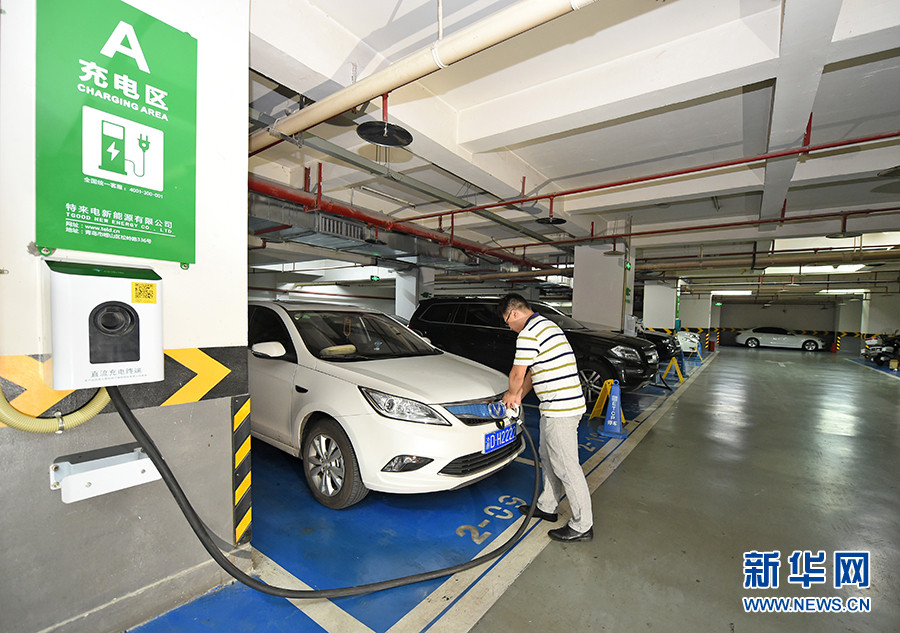


(Photo/Xinhua)
Auto consumption is an integral part of China’s consumption market, and the country has been striving to make the whole life cycle of vehicles greener, from new-car business to the second-hand market and scrap.
According to statistics released by the China Automobile Dealers Association (CADA), a total of 27.8 million vehicles were sold in China last year, accounting for 30 percent of the global total.
When selecting new cars, Chinese consumers are beginning to favor new energy vehicles (NEVs). China sold 1.3 million NEVs in 2018, 61.7 percent more than a year ago, maintaining the world’s largest NEV market.
Wang Wei, who works in a hospital in southern China’s Guangdong province, explained that after comparing online, he decided to buy an electric vehicle. He said his new NEV is energy-saving and environment-friendly, but also, maintenance is cheaper.
Wang hopes that the future advancement of technology could further diversify choices and lower NEV prices.
China’s used-car market is also helping the auto industry go green, as better circulation of second-hand vehicles helps build a greener and more efficient auto circulation.
According to CADA, a total of 13.8 million second-hand vehicles were traded in China last year, up 11.5 percent from a year ago, with a total transaction of 860 billion.
Though the market has been expanding rapidly, the Chinese used-car market still has enormous potential. In developed countries, the sales of used cars are usually twice that of the new models, while in China, the proportion is less than half.
China is also making strides to recycle major assemblies of automobiles, as recycling can save 60 percent of energy, 70 percent of materials, and 50 percent of the cost. It would also cut 80 percent of pollutant discharge.
A man from Tianjin municipality received a subsidy of 18,000 yuan for scraping his 15-year-old vehicle. According to this source, the car could have been sold for 20,000 yuan in the used car market, but the process would have taken longer. “I never thought that I could get so much money by scraping it,” he told People’s Daily.
The high subsidy for scrapped cars is a result of a document released by China’s State Council this May to allow recycling of automobile assemblies including engines, steering assemblies, gears, front and rear axles, and frames. This enabled used car parts with high added value to be recycled, which is both energy-saving and environment-friendly.
 Fire brigade in Shanghai holds group wedding
Fire brigade in Shanghai holds group wedding Tourists enjoy ice sculptures in Datan Town, north China
Tourists enjoy ice sculptures in Datan Town, north China Sunset scenery of Dayan Pagoda in Xi'an
Sunset scenery of Dayan Pagoda in Xi'an Tourists have fun at scenic spot in Nanlong Town, NW China
Tourists have fun at scenic spot in Nanlong Town, NW China Harbin attracts tourists by making best use of ice in winter
Harbin attracts tourists by making best use of ice in winter In pics: FIS Alpine Ski Women's World Cup Slalom
In pics: FIS Alpine Ski Women's World Cup Slalom Black-necked cranes rest at reservoir in Lhunzhub County, Lhasa
Black-necked cranes rest at reservoir in Lhunzhub County, Lhasa China's FAST telescope will be available to foreign scientists in April
China's FAST telescope will be available to foreign scientists in April "She power" plays indispensable role in poverty alleviation
"She power" plays indispensable role in poverty alleviation Top 10 world news events of People's Daily in 2020
Top 10 world news events of People's Daily in 2020 Top 10 China news events of People's Daily in 2020
Top 10 China news events of People's Daily in 2020 Top 10 media buzzwords of 2020
Top 10 media buzzwords of 2020 Year-ender:10 major tourism stories of 2020
Year-ender:10 major tourism stories of 2020 No interference in Venezuelan issues
No interference in Venezuelan issues
 Biz prepares for trade spat
Biz prepares for trade spat
 Broadcasting Continent
Broadcasting Continent Australia wins Chinese CEOs as US loses
Australia wins Chinese CEOs as US loses